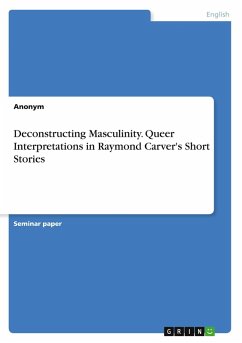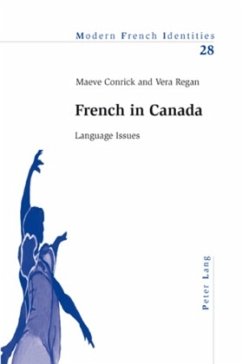
Language and Gender Research from a Queer Linguistic Perspective
A Critical Evaluation
Versandkostenfrei!
Versandfertig in 6-10 Tagen
32,99 €
inkl. MwSt.

PAYBACK Punkte
16 °P sammeln!
Michaela Koch explains the development of a new line of research in sociolinguistics called queer linguistics. Rooted in poststructuralist approaches to gender as a social construction, queer linguistics offers a critical framework for sociolinguistic analysis that values diversity and avoids over-generalization and stereotyping. Koch describes the history of language and gender research from the 1920's up to today and analyzes different shifts of perspectives of research. Critically, she reflects the concept of performativity, which was originally introduced by J.L. Austin and reframed by Jud...
Michaela Koch explains the development of a new line of research in sociolinguistics called queer linguistics. Rooted in poststructuralist approaches to gender as a social construction, queer linguistics offers a critical framework for sociolinguistic analysis that values diversity and avoids over-generalization and stereotyping.
Koch describes the history of language and gender research from the 1920's up to today and analyzes different shifts of perspectives of research. Critically, she reflects the concept of performativity, which was originally introduced by J.L. Austin and reframed by Judith Butler into the concept of gender performativity in the 1990's. In addition to theoretical basics and methodology, this book introduces several model analyses and shows insistently the advantages of the queer linguistic framework. With its comprehensive overview of the development of language and gender research and its critical introduction to queer linguistics the book addresses linguistic scholars and students as well as scholars and students interested in gender studies.
Kristina Reiss
Koch describes the history of language and gender research from the 1920's up to today and analyzes different shifts of perspectives of research. Critically, she reflects the concept of performativity, which was originally introduced by J.L. Austin and reframed by Judith Butler into the concept of gender performativity in the 1990's. In addition to theoretical basics and methodology, this book introduces several model analyses and shows insistently the advantages of the queer linguistic framework. With its comprehensive overview of the development of language and gender research and its critical introduction to queer linguistics the book addresses linguistic scholars and students as well as scholars and students interested in gender studies.
Kristina Reiss












